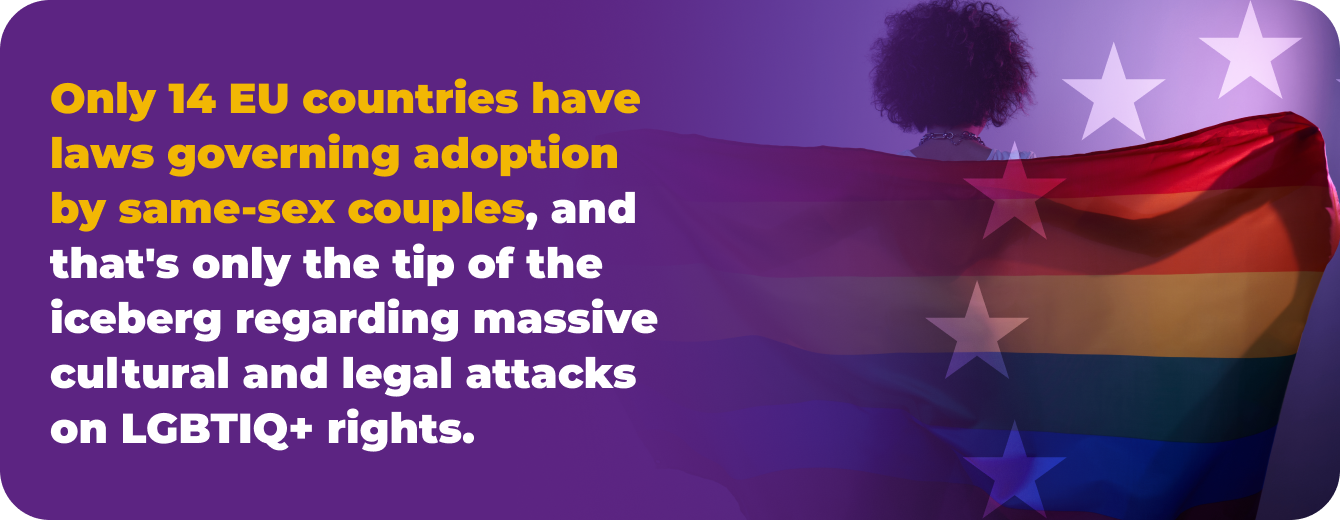Protect LGBTIQ+ Rights
"The summer of 2027 is full of events in Greece. David and Matthew hold each other’s hands and watch the latest news with emotional eyes. On TV, the reporter announces:
- 'Now it's official! Greece recognises the rights of the LGBTIQ+ community to adopt!'
Tears slide down both of their faces. The happiness they feel is reflected in their eyes. They turn and start jumping up and down around the room. Suddenly, David stops and points his finger at Matthew.
- 'I told you we had to vote in 2024. If I'd gone along with your idea that nothing would change this time, we might've missed out!'”
Today, like never before, the LGBTIQ+ people need reassurance that their human rights are valued and recognised. Only 14 EU countries have laws governing adoption by same-sex couples, and that's only the tip of the iceberg regarding massive cultural and legal attacks on LGBTIQ+ rights. It's time to put a STOP to discrimination and fight for EQUALITY.
For the fourth year in a row, Poland holds the worst record on LGBTIQ+ rights in the EU, followed by Romania and Bulgaria, as shown in a report from rights organization ILGA-Europe released in May 2024. The report ranks European countries based on a review of laws and policies affecting lesbian, gay, bisexual, transgender and intersex (LGBTI) people.
In Italy, the latest moves by the far-right Giorgia Meloni have already had outcomes for same-sex parents. The public prosecutor from the northern town of Padua declared the birth certificates of 33 young people, born to lesbian couples, to be illegal. Authorities informed municipalities in March that registering children of same-sex parents is no longer legally recognized. However, Italy did legalise same-sex civil unions in 2016 under a centre-left government. Added to this are the anti-LGBTIQ+ legal guidelines in Hungary, that have also been copied in Romania. "Violent incidents in the streets have increased, in addition to discrimination in universities and the workplace," says Hugendubel, "due to the ‘transphobic hatred’ surrounding the new 'trans law' of Pedro Sánchez's modern government."
Full joint adoption by same-sex couples is legal in 14 EU countries: the Netherlands (since 2001), Sweden (2003), Spain (2005), Belgium (2006), Denmark (2010), France (2013), Malta (2014), Luxembourg (2015), Austria (2016), Ireland (2016), Portugal (2016), Finland (2017), Germany (2017) and Slovenia (2023).
In Europe today, the fight for LGBTIQ+ rights has emerged as one of the most essential battles for equality. Advanced, country-wide legislation in nations like Malta, Belgium and Denmark, coexist with conditions in which LGBTIQ+ rights are hindered, like in Poland, Romania and Bulgaria. At the same time, when the broader European continent is concerned, the worst nations in which to be a member of the LGBTIQ+ community are Azerbaijan, Turkey, Russia and Armenia (ILGA Rainbow Europe report, 2023).
Implementing strong legal protections for the rights of the LGBTIQ+ community, as well as clear anti-discrimination legal guidelines on homo- and trans- phobia, could fill in gaps within the present legal and safety context. What's more, it is well-known that intersectionality performs a key position in advocating for LGBTIQ+ rights, as a result encouraging a more safe, diverse and inclusive society.
By setting up the inclusion of LGBTIQ+ rights and safety as one of the standards used in the course of EU expansion and accession tactics, it fosters diversity, combats discrimination and offers assistance and advocacy to LGBTIQ+ groups all around the globe. The aim is to become catalysts for change by advocating for equal treatment policies, regardless of any discriminatory beliefs based on sexual orientation or gender identity. These political actions will focus on ensuring that the following goals find concrete pathways for implementation in legislative measures and regulations.
Legal safety of LGBTIQ+ rights within the European Union:
• Extend efforts past the EC LGBTIQ Equality Strategy and incorporate EU anti-discrimination regulation to ensure LGBTIQ+ rights. Improve existing human rights and anti-discrimination laws to foster further inclusivity for the LGBTIQ+ community.
• Address intersectionality inside LGBTIQ+ rights, primarily based on more than one identification marker (gender, ethnicity, religion, etc.).
• Include the rights of LGBTIQ+ families (adoption rights, marriage equality, anti-discrimination protections, healthcare access, inclusive surroundings, etc.).
Integrate LGBTIQ+ rights into overseas regulations:
• Make LGBTIQ+ rights safety a criterion withinside the EU expansion and accession tactics via ways of selling variety and preventing discrimination.
• Support and fund cooperation packages with civil society in nations in which LGBTIQ+ rights are under attack. Provide assistance, safety, and advocacy for LGBTIQ+ groups that face consistent threats.
• Foresee binding clauses committed to human rights safety in Trade Agreements.
• Oblige events to stick to human rights requirements and concepts as a means of ensuring accountability, transparency, and defense of human rights.
The fight for LGBTIQ+ rights remains a critical issue in Europe, with progress marked by Greece's recent change to adoption rights, but significant challenges are still present in many countries. By advocating for robust legal protections and anti-discrimination laws, and making LGBTIQ+ rights a key criterion in EU policies, we can strive towards a future of equality and inclusivity.

